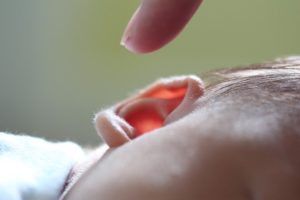Too many people associate hearing loss strictly with old age. But hearing loss in children is far more common than most people suppose, affecting as much as 15% of people. Whenever a child is born with hearing loss, we refer to it is as ‘congenital.’ You might wonder: what causes congenital hearing loss? Today, we’ll break the causes down into two basic categories, and give some examples of each.

Congenital hearing loss isn’t necessarily genetic. Here’s what you need to know about hereditary and non-hereditary hearing loss in children.
Non-hereditary
When most people hear the word ‘congenital,’ they assume it means ‘hereditary.’ But this is not always the case. Frequently, children with congenital hearing loss lack the genes associated with hearing loss, but experience symptoms of it anyway. These individuals fall into our first category: non-hereditary congenital hearing loss.
Here are some of the most common causes:
- Maternal infections, including herpes simplex and rubella
- Various birth injuries
- Fetal alcohol syndrome
- Maternal drug use during pregnancy
Non-hereditary congenital hearing loss is admittedly less common than the alternative, but it does happen. It accounts for roughly 25% of instances of hearing loss in children. But what exactly is the alternative?
Hereditary
As you might have guessed, the other major form of congenital hearing loss is hereditary. This means that we can attribute the hearing loss to a particular genetic defect. Hearing loss has an especially strong correlation with the following disorders:
- Usher syndrome
- Alport syndrome
- Waardenburg syndrome
- Down syndrome
Hereditary congenital hearing loss does not occur due to the actions of a particular individual, such as a pregnant mother or negligent medical professional. On the contrary, a quirk in the DNA of one or more parents results in a reduction in hearing ability.
The Solution
The good news for children born with congenital hearing loss—be it hereditary or otherwise—is that there are solutions. In the modern era, audiology is more advanced than it has ever been before. Increasingly, there are solutions that can dramatically improve all but the most severe instances of hearing loss.
From hearing aids to cochlear implants, there is a wide variety of solutions for children with hearing loss. If you suspect your child has congenital hearing loss, contact us today for a hearing evaluation. Our expert audiologists are ready to help.
Contact Bay Area Audiology Today
Ready to change the way you look at hearing loss? Our Doctor of Audiology, Dr. Trisha A. Bents Muth, is exceptionally experienced in the art of audiology and is dedicated to providing the absolute best solutions. Bay Area Audiology has been working to give patients a comfortable environment with thorough evaluations. We are independently owned, and unbiased when it comes to finding you the care you need.
You can always come into the office or contact us in advance to set up an appointment. We also provide updates on our social media websites. You can check out our Facebook, Twitter, LinkedIn, and Pinterest to keep up with Bay Area Audiology.
Don’t hesitate–we can help.
